
Sylvia Plath was an American poet, novelist, and short story writer. She is credited with advancing the genre of confessional poetry and is best known for The Colossus and Other Poems (1960), Ariel (1965), and The Bell Jar, a semi-autobiographical novel published shortly before her suicide in 1963. The Collected Poems was published in 1981, which included previously unpublished works. For this collection Plath was awarded a Pulitzer Prize in Poetry in 1982, making her the fourth to receive this honor posthumously.

The Bell Jar is the only novel written by the American writer and poet Sylvia Plath. Originally published under the pseudonym "Victoria Lucas" in 1963, the novel is supposedly semi-autobiographical with the names of places and people changed. The book is often regarded as a roman à clef because the protagonist's descent into mental illness parallels Plath's experiences with what may have been clinical depression or bipolar II disorder. Plath died by suicide a month after its first United Kingdom publication. The novel was published under Plath's name for the first time in 1967 and was not published in the United States until 1971, in accordance with the wishes of both Plath's ex-husband Ted Hughes and her mother. The novel has been translated into nearly a dozen languages.

Starting Over is a 1979 American comedy film based on Dan Wakefield's 1973 novel, produced by James L. Brooks, and directed by Alan J. Pakula. Starring Burt Reynolds, Jill Clayburgh, and Candice Bergen, it follows a recently divorced man who is torn between his new girlfriend and his ex-wife.

Sylvia is a 2003 British biographical drama film directed by Christine Jeffs and starring Gwyneth Paltrow, Daniel Craig, Jared Harris, and Michael Gambon. It tells a story based on the real-life romance between prominent poets Sylvia Plath and Ted Hughes. The film begins with their meeting at Cambridge in 1956 and ends with Sylvia Plath's suicide in 1963.
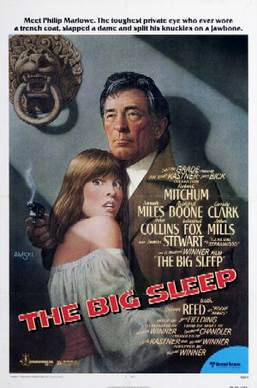
The Big Sleep is a 1978 neo-noir film, the second film version of Raymond Chandler's 1939 novel of the same name. The picture was directed by Michael Winner and stars Robert Mitchum in his second film portrayal of the detective Philip Marlowe. The cast includes Sarah Miles, Candy Clark, Joan Collins and Oliver Reed, and features James Stewart as General Sternwood.
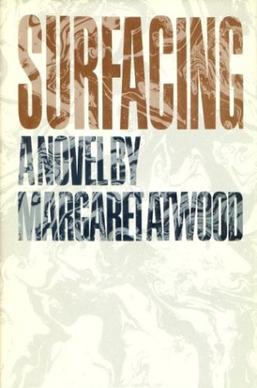
Surfacing is a novel by Canadian author Margaret Atwood. Published by McClelland and Stewart in 1972, it was her second novel. Surfacing has been described by commentators as a companion novel to Atwood's collection of poems, Power Politics, which was written the previous year and deals with complementary issues.
Diane Johnson, is an American novelist and essayist whose satirical novels often feature American heroines living in contemporary France. She was a finalist for the Pulitzer Prize for her novel Persian Nights in 1988.
Aurelia Frances Plath was an American associate professor of medical secretarial skills at Boston University, the wife of Otto Plath, and the mother of author Sylvia Plath and Warren Plath.
Marjorie Kellogg was an American author.

Lost and Found is a 1979 British romantic comedy film co-written and directed by Melvin Frank and starring George Segal and Glenda Jackson.

Sunburn is a 1979 British-American comedy detective film directed by Richard C. Sarafian and written by James Booth, John Daly and Stephen Oliver. It is based on the novel The Bind by Stanley Ellin. The film stars Farrah Fawcett, Charles Grodin, Art Carney, Joan Collins, William Daniels and John Hillerman. The film was released on August 10, 1979, by Paramount Pictures.

The Other Side of the Mountain is a 1975 American drama romance film based on the true story of ski racing champion Jill Kinmont. The film was titled A Window to the Sky in the United Kingdom.
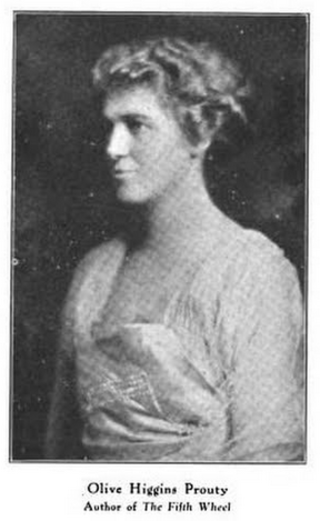
Olive Higgins Prouty was an American novelist and poet, best known for her 1923 novel Stella Dallas and her pioneering consideration of psychotherapy in her 1941 novel Now, Voyager.
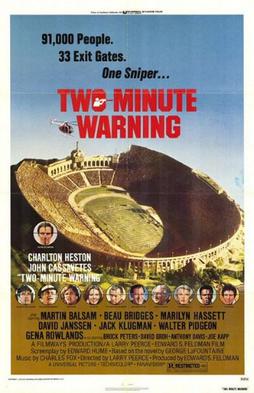
Two-Minute Warning is a 1976 action thriller film directed by Larry Peerce and starring Charlton Heston, John Cassavetes, Martin Balsam, Beau Bridges, Jack Klugman, Gena Rowlands, and David Janssen. It was based on the novel of the same name written by George LaFountaine. The film was nominated for an Academy Award for Best Film Editing.

Love and Bullets is a 1979 action crime film directed by Stuart Rosenberg. and starring Charles Bronson, it is based on a screenplay by Wendell Mayes and John Melson.
Lawrence "Larry" Peerce is an American film and TV director whose work includes the theatrical feature Goodbye, Columbus (1969), the early rock and roll concert film The Big T.N.T. Show (1965), One Potato, Two Potato (1964), The Other Side of the Mountain (1975) and Two-Minute Warning (1976).
Marilyn Hassett is an American actress. She is best known for playing the role of Jill Kinmont in the romance drama film The Other Side of the Mountain (1975) for which she received Golden Globe Awards and its sequel The Other Side of the Mountain Part 2 (1978). Hassett also starred in films Shadow of the Hawk (1976) and The Bell Jar (1979).

Sylvia Plath (1932–1963) was an American author and poet. Plath is primarily known for her poetry, but earned her greatest reputation for her semi-autobiographical novel The Bell Jar, published pseudonymously weeks before her death.
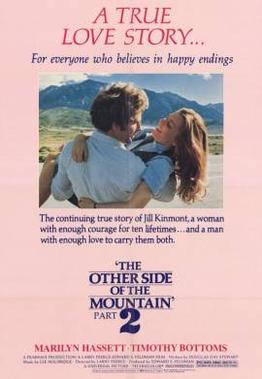
The Other Side of the Mountain Part 2 is a 1978 film directed by Larry Peerce. It stars Marilyn Hassett and Timothy Bottoms. It is a sequel to The Other Side of the Mountain.
Ruth Tiffany Barnhouse, also known by her married name Ruth Beuscher, was an American psychiatrist, theologian, and Episcopal priest. Best known for being the psychiatrist of Sylvia Plath, she corresponded with her since they met at McLean Hospital in Belmont, Massachusetts following Plath's breakdown in 1953. Though Plath destroyed most of their letters, fourteen from Plath to Barnhouse remain.













